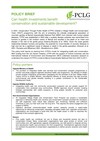Can improving health reduce threats to nature conservation?
IIED supported a project in Uganda that sought to understand the links between supporting community health and conserving Bwindi Impenetrable National Park and its mountain gorillas.

Conservation Through Public Health (CTPH) is a Ugandan NGO that seeks to improve local community health as a way to reduce conservation threats.
CTPH supports a network of volunteers called village health and conservation teams (VHCTs) at several sites of conservation importance in Uganda and the Democratic Republic of Congo (DRC) but to date has focused on the area around Bwindi Impenetrable National Park.
The role of the VHCTs is to provide community health services and to raise awareness about conservation in villages bordering protected areas. The aim is to reduce pressure on natural resources within those protected areas and minimise the risk of transmission of zoonotic diseases between people, wildlife and livestock.
In each village, the volunteers visit residents in their homes to give advice relating to hygiene and sanitation practices, family planning and conservation. They also give talks to small groups of people on the same topics. The volunteers have also been trained to make referrals to local health centres in the case of household illnesses that require clinical treatment.
CTPH has seen improvements in health outcomes around Bwindi and increased adoption of family planning. They have also seen more support for conservation, but the evidence is largely anecdotal and the link between health care provision and support for conservation has not been proven.
The ‘Can health investments benefit conservation and sustainable development?’ project sought to evaluate the effectiveness of CTPH's programmes, explore the evidence for relationships between health improvements and conservation outcomes, and use the evidence to improve and roll out the approach to other great ape protected areas within Uganda.
What did IIED do?
IIED worked with CTPH and the University of Oxford to support the translation of research results into policy advice and learning materials and to communicate outcomes to an international audience.
News and updates
Publications
Partners
Conservation Through Public Health, Uganda
Interdisciplinary Centre for Conservation Science, University of Oxford
Jane Goodall Institute, Uganda







